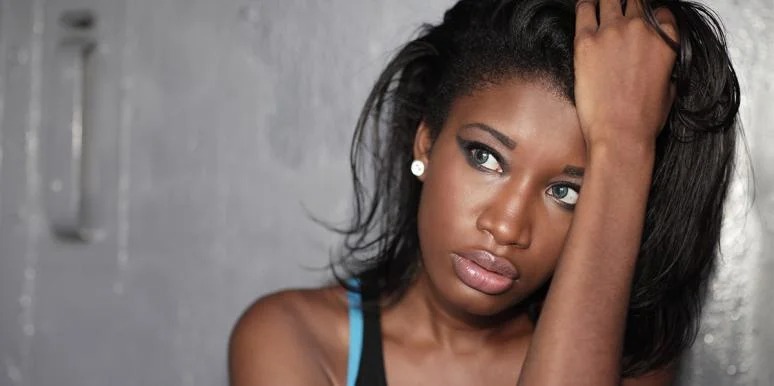Growing up, I was extremely thin. It's not that I was starving myself; in fact, I loved to eat. But no matter how much food I consumed, I never was able to budge from a size zero.
For much of my adolescence, my peers ridiculed me because of my size. As a teen, when everyone my age was starting to fill out and develop curves, I remained considerably thin. It took a toll on my confidence.
The issue of my weight reached a boiling point one summer day when I decided to wear shorts, which I'd never dared before because I was too self-conscious.
Two men yelled at me from across the street, "Take those shorts off; you’re too skinny for that!"
I was humiliated. Sure, I tried to laugh it off, but nothing was remotely funny about how I had been made to feel. After that day, I made it a point to never don a pair of shorts or a short skirt again.
Being "too thin" may sound like a problem most women would give anything to have, but my reality was different.
As a woman of mixed heritage, my culture places a greater emphasis on being curvy. I've never held myself to the mainstream standard of beauty: being skinny. But I am. Back then, even more so — and it was a liability.
I didn't even realize the irony of my problem until a few years later when I started working in a predominantly white office. I was no longer a size zero, but I still wanted to gain more weight.
Most of the women I worked with were obsessed with exercising and dieting. It was strange to me; all of these women were struggling for a body like mine, but when I looked at them, I secretly wished I were their size.
Bear in mind, these women were no bigger than a size nine at best. I saw them as shapely and attractive; not too thick and not too small. We'd talk about weight, and I'd be astonished at our starkly different perceptions of what an "acceptable" dress size was.
It was amazing how different our body goals were — and what we put ourselves through to achieve them.
And it's not even like we grew up in different countries. Here we were, American women who watched the same movies, read the same magazines, and even liked similar fashions. But we drew the line when it came to body image.
It slowly dawned on me what a strong influence a person's culture can have on her perception of beauty — and how, if I had been born into a different culture, I would never have experienced all of those body insecurities growing up.
As you might have guessed, those guys who ridiculed me for looking too skinny in my shorts were men of color, like me. If it were a group of white men on the corner that day, odds are I would be telling a whole different story.
That's not to say every single person is a prisoner of the culture he or she grew up in, but it’s hard to argue the idea that heritage heavily influences what we find attractive. It's funny how I could feel so out of place all those years just because I was someone else's idea of beauty instead of my own.
And while cultures vary in their ideals of beauty, they share one common flaw: the pressure to look perfect, whatever perfect may be, contributes to low self-esteem in women.
The reality is that every woman should strive to be healthy, whether healthy is a size zero or a size twelve for her particular frame.
Every woman is different and beautiful in her own way, so why should we all try to look the same?
I didn't become comfortable with my body until my late twenties, and I honestly regret that. I wish I'd learned to love my body sooner.
Two children and a decade after I first became conscious of my body, I've finally realized just how beautiful I am — and how beautiful my body is.
I may never have an ample derriere like J. Lo, and my coworkers may never reach a size two, but one thing we all can achieve is self-acceptance — and that’s the most beautiful trait of all.
Latest Stories
-
IPR Ghana@50: Pupils educated to keep the environment clean
5 mins -
PenTrust CEO named ‘Best Pensions CEO’, company wins ‘Scheme Administrator Award’ at Ghana Accountancy & Finance Awards 2024
25 mins -
Alan Kyerematen’s ‘Brighter Future for Health Professionals’ in Ghana Revealed in Bono
35 mins -
NPP will ensure a safer, cleaner and greener environment – Dr Kokofu
43 mins -
2024 Election: Police to deal with individuals who will cause trouble – IGP
44 mins -
Seychelles President’s visit rekindles historical and diplomatic ties with Ghana
50 mins -
Election 2024: EC destroys defective ballot papers for Ahafo and Volta regions
60 mins -
2024 Election: I am sad EC disqualified me, but I endorse CPP’s candidate – PNP’s Nabla
1 hour -
I want to build a modern, inclusive country anchored by systems and data – Bawumia to CSOs
1 hour -
Miss Health Ghana 2024: Kujori Esther Cachana crowned new Health Ambassador
2 hours -
Livestream: The manifesto debate on WASH and climate change
2 hours -
Alan Kyerematen saddened by NDC and NPP’s neglect of Krofrom Market in the Ashanti Region
2 hours -
CSIR Executive Director urges farmers to adopt technology for improved farming
2 hours -
Football Impact Africa’s Ghetto Love Initiative inspires change in Teshie
2 hours -
Peter Toobu calls for tighter border security over uncovered weapons at Tema Port
2 hours

